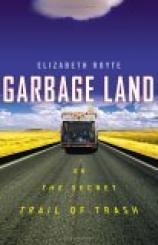Reading Group Guide
Discussion Questions
Garbage Land: On the Secret Trail of Trash

1. Elizabeth Royte’s trip to the Gowanus Canal was one of the factors that compelled her to embark on her strange journey. What compelled you to pick up Garbage Land and join her on her journey? Did you ever wonder what actually happened to the things you throw away?
2. Garbage Land is a first-person narrative in which Elizabeth Royte guides readers through the hidden world of garbage. What does this first-person point of view add to the book? Do you think this book would have been as effective if it had been written from an omniscient narrator’s point of view?
3. The author notes that trying to be environmentally responsible isn’t always easy. Indeed, she writes (on page 141) that her publisher couldn’t justify the added cost of printing the book on recycled paper stock. How can we reconcile the moral arguments for recycling with the economic arguments against it?
4. Garbage Land features a bevy of interesting characters, many of whom suggest innovative ways to reduce our garbage footprint. For example, Christina Datz-Romero is a proponent of desktop worm composters. Would you consider using one of these innovative methods? If so, which ones?
5. Elizabeth Royte writes about trailing sanitation workers, visiting waste transfer stations, and exploring landfills. How did getting an inside look at these three parts of the disposal process broaden your understanding of the costs of consumption? What was most surprising about the author’s visits?
6. Less than 27 percent of garbage is recycled and composted. But in some cities—San Francisco, for example—the rate is much higher. What do you think about the measures that the San Francisco government has taken to inch toward the “dream of zero waste”? Do you think similar measures could be effective in your city or town?
7. The author discusses recycling and reducing consumption. Which approach to minimizing garbage does she ultimately think is more effective? Do you agree?
8. Have you noticed a change in our country’s waste stream in your lifetime? Explain your answer.
9. In Garbage Land, a former sanitation commissioner controversially claims, “In the end, the garbage will win.” Does the author seem to agree with this sentiment? Do you?
10. How can we, as a society, reduce our garbage footprint? Has this book made you decide to change your behavior?
Garbage Land: On the Secret Trail of Trash
- Publication Date: July 13, 2005
- Hardcover: 320 pages
- Publisher: Little, Brown and Company
- ISBN-10: 0316738263
- ISBN-13: 9780316738262







